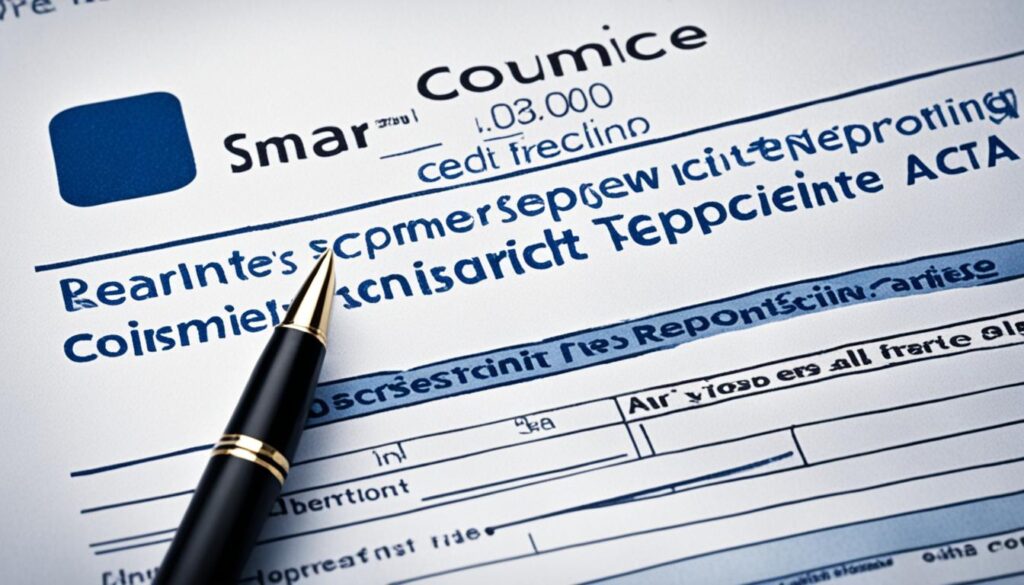Credit report errors can be overwhelming. A credit dispute attorney can help. These experts assist consumers with credit reporting issues and protect their rights.
These attorneys know the Fair Credit Reporting Act inside out. They guide you through disputing errors on your report. Their expertise can help improve your credit score.
Choosing the right lawyer is vital for credit disputes. A skilled attorney can significantly impact your case’s outcome. They safeguard your consumer rights and explain your legal options.
With their support, you can confidently challenge credit bureaus and creditors. Their knowledge helps you navigate complex credit reporting problems effectively.
Key Takeaways
- Credit dispute attorneys specialize in resolving credit report errors
- They have extensive knowledge of the Fair Credit Reporting Act
- Legal representation can improve your chances of successful credit disputes
- Attorneys protect your consumer rights throughout the process
- Expert guidance helps navigate complex credit reporting issues
Understanding the Role of a Credit Dispute Attorney
Credit dispute attorneys protect consumer rights and tackle credit report errors. They help people navigate complex credit disputes. These experts ensure fair treatment under the law.
What Does a Credit Dispute Attorney Do?
Credit dispute attorneys fix inaccuracies in credit reports. They review files, gather evidence, and talk to credit bureaus. When needed, they represent clients against creditors or reporting agencies.
When to Seek Legal Representation for Credit Issues
It’s time to consult a credit dispute attorney when:
- You’ve found errors on your credit report that persist after attempts to correct them
- You’re facing aggressive debt collection practices
- Your credit score has significantly dropped due to inaccurate information
- You suspect identity theft affecting your credit
Benefits of Hiring a Credit Dispute Attorney
Hiring a credit dispute attorney has many perks. They offer expert knowledge of consumer rights and credit laws. They increase your chances of winning disputes.
These lawyers protect you from unfair practices. They can resolve credit issues faster. You’ll have peace of mind knowing a pro handles your case.
- Expert knowledge of consumer rights and credit laws
- Increased chances of successful dispute resolution
- Protection from unfair practices by creditors or collection agencies
- Potential for faster resolution of credit issues
- Peace of mind knowing a professional is handling your case
| Aspect | Without Attorney | With Credit Dispute Attorney |
|---|---|---|
| Legal Knowledge | Limited | Extensive |
| Success Rate | Lower | Higher |
| Time Investment | Significant | Minimal |
| Stress Level | High | Reduced |
The Fair Credit Reporting Act (FCRA) and Your Rights

The Fair Credit Reporting Act protects consumer rights in credit reporting. It sets standards for collecting, using, and sharing credit information. This law empowers consumers to access their credit reports and challenge inaccuracies.
The FCRA grants you several important rights. You can get a free yearly credit report. You’ll be notified if your file is used against you.
You can dispute incorrect or incomplete information. Outdated negative details must be removed from your report.
- Request a free copy of your credit report annually
- Be informed if information in your file has been used against you
- Dispute incomplete or inaccurate information
- Have outdated negative information removed from your report
Credit bureau disputes are crucial under the FCRA. If you spot errors, you can file a dispute. The bureaus must investigate and respond within 30 days.
This process helps maintain accurate credit reports. It safeguards your financial health by ensuring correct information.
The FCRA also restricts access to your credit report. Employers, landlords, and lenders need your consent first. This protects your privacy and prevents misuse of your data.
“The Fair Credit Reporting Act empowers consumers to take control of their credit information and challenge inaccuracies that could harm their financial future.”
Knowing your FCRA rights is vital for managing your credit. It’s a powerful tool for your financial wellbeing. These rights help ensure your credit report’s accuracy.
You can protect yourself from unfair practices by exercising these rights. Credit dispute software can simplify monitoring and maintaining your credit health.
| FCRA Right | Consumer Benefit |
|---|---|
| Free Annual Credit Report | Regular credit monitoring |
| Dispute Inaccuracies | Improved credit score accuracy |
| Removal of Outdated Information | Fair representation of current credit status |
| Limited Access to Credit Report | Enhanced privacy protection |
Common Credit Report Errors and Their Impact
Credit report errors can hurt your financial health. Understanding these mistakes helps improve your credit score. Let’s look at common errors and their effects.
Types of Credit Report Errors
Credit reports often have mistakes that can harm your creditworthiness. These range from simple typos to serious identity mix-ups.
Common errors include wrong personal info, duplicate accounts, and outdated account statuses. Mistaken identity and fraudulent accounts due to identity theft also occur.
How Errors Affect Your Credit Score
Credit report errors can greatly impact your credit score. Mistakes might lower your score, making it harder to get loans.
A wrongly reported late payment could drop your score by 100 points or more. This affects your ability to secure favorable interest rates.
Steps to Identify Credit Report Errors
Check your credit reports often to catch and fix errors. Here’s how to spot potential mistakes:
- Request free annual reports from all three major credit bureaus
- Review personal information for accuracy
- Check account details, balances, and payment history
- Look for unfamiliar accounts or inquiries
- Compare reports from different bureaus for consistency
| Error Type | Potential Impact | Action Required |
|---|---|---|
| Incorrect Late Payment | 50-100 point score drop | Dispute with bureau and creditor |
| Identity Mix-up | Varies widely | File detailed dispute, provide ID proof |
| Fraudulent Account | Severe score drop | Report fraud, place credit freeze |
Credit Dispute Attorney: Expertise and Specializations
Credit dispute attorneys have diverse skills to address various financial challenges. They specialize in different credit law areas. These experts offer custom solutions for clients with credit problems.

Many attorneys focus on credit repair services. They remove wrong or old information from credit reports. This helps clients boost their credit scores.
These lawyers know credit reporting laws well. They can talk to credit bureaus for their clients effectively.
Identity theft protection is another key area for credit dispute attorneys. They help victims fix fraudulent accounts. These experts also work to restore their clients’ credit standing.
They handle disputes for unauthorized charges. They also seek compensation for damages caused by identity theft.
Some credit dispute attorneys focus on bankruptcy law. They help clients understand their options during financial restructuring. These lawyers also protect their clients’ rights in the bankruptcy process.
| Specialization | Key Services |
|---|---|
| Credit Repair | Dispute inaccuracies, remove negative items |
| Identity Theft Protection | Resolve fraudulent accounts, restore credit |
| Bankruptcy | Guide through bankruptcy process, protect assets |
| Debt Settlement | Negotiate with creditors, reduce debt |
Knowing these specializations helps consumers choose the right attorney. They can find one that fits their specific needs. This ensures they get the best help for their financial situation.
The Credit Dispute Process: What to Expect
Credit report errors can be frustrating. A credit dispute attorney can help you navigate the process. They’ll protect your rights and guide you through each step.
Initial Consultation and Case Evaluation
Your journey begins with a credit dispute attorney meeting. They’ll review your credit reports and spot errors. Then, they’ll create a strategy to tackle your case.
Gathering Evidence and Documentation
Strong evidence is vital for credit bureau disputes. Your attorney will help collect important documents. These may include bank statements, payment records, and creditor correspondence.
Filing Disputes with Credit Bureaus
Your attorney will draft and submit formal disputes to credit bureaus. They’ll include all necessary info and meet deadlines. Credit report accuracy is crucial for your financial health.
| Step | Timeline | Key Actions |
|---|---|---|
| Initial Consultation | 1-2 weeks | Review credit reports, identify errors |
| Evidence Gathering | 2-4 weeks | Collect documents, organize proof |
| Filing Disputes | 1-2 weeks | Submit formal disputes to bureaus |
| Bureau Investigation | 30-45 days | Wait for bureau response |
Your attorney will keep you updated throughout the process. They’ll handle any follow-up actions as needed. If disputes aren’t resolved, they’ll prepare for possible legal action.
Credit bureau disputes can be complex. Managing your credit reports is key to your financial future. An experienced attorney can make all the difference.
Legal Strategies for Resolving Credit Disputes
Credit dispute attorneys use various legal strategies to help clients with credit issues. These approaches aim to fix errors and boost credit scores. Let’s explore some effective tactics for credit dispute resolution.

A key strategy involves using the Fair Credit Reporting Act (FCRA). This law shields consumers from inaccurate reporting. Attorneys can use FCRA rules to challenge errors on credit reports.
They may ask for debt validation or removal of old information. Another useful tool is the dispute letter. Attorneys write compelling letters to credit bureaus and creditors.
These letters point out errors and demand fixes. The aim is to remove negative items from credit reports.
Sometimes, legal action is needed. Attorneys might sue creditors or credit bureaus for breaking FCRA rules. This can lead to settlements or court-ordered credit report fixes.
“A well-executed legal strategy can significantly improve a client’s credit standing and financial future.”
Credit repair services often work alongside these legal strategies. Attorneys handle legal matters, while credit repair companies help with ongoing monitoring and support.
| Legal Strategy | Purpose | Potential Outcome |
|---|---|---|
| FCRA Enforcement | Ensure compliance with federal law | Correction of errors, removal of inaccuracies |
| Dispute Letters | Challenge incorrect information | Removal of negative items |
| Legal Action | Address serious violations | Settlements, court-ordered corrections |
Credit dispute attorneys use these strategies to solve complex credit issues. Their goal is to restore their clients’ financial standing.
Consumer Rights in Debt Collection Practices
Debt collection laws protect consumer rights. The Fair Debt Collection Practices Act (FDCPA) sets rules for debt collectors. It ensures fair treatment of consumers.
Knowing these laws empowers you to defend your rights. You can seek help when needed.
Understanding the Fair Debt Collection Practices Act
The FDCPA outlines what debt collectors can and cannot do. It bans harassment, false statements, and unfair practices. Collectors must provide written notice about the debt.
They must respect your right to dispute it. If you face issues, a credit dispute attorney can guide you.
Recognizing Illegal Debt Collection Tactics
Illegal tactics include:
- Calling at unreasonable hours
- Using threats or abusive language
- Contacting you at work after being told not to
- Discussing your debt with others
- Misrepresenting the amount owed
How a Credit Dispute Attorney Can Help
A credit dispute attorney knows consumer rights and debt collection laws. They can assist you in various ways.
| Service | Benefit |
|---|---|
| Review collection practices | Identify FDCPA violations |
| Communicate with collectors | Stop harassment |
| File lawsuits if necessary | Seek damages for violations |
| Negotiate debt settlements | Reduce amount owed |
Know your rights to protect yourself from unfair practices. Work with a skilled attorney to resolve issues effectively.
Improving Your Credit Score: Legal Approaches
Boosting your credit score requires time and effort. Legal strategies can help speed up this process. Credit repair services offer tools and expertise to improve your score.
These services often employ credit dispute attorneys. These experts understand credit law intricacies. They can guide you through the improvement process effectively.
One effective method is to identify and dispute inaccuracies on your credit report. Credit monitoring is crucial here. Regular checks help spot errors quickly.
Negotiating with creditors is another legal approach. An attorney can help set up payment plans. They may even settle debts for less than you owe.
- Review your credit reports regularly
- Dispute any inaccuracies promptly
- Negotiate with creditors to improve terms
- Set up automatic payments to avoid late fees
There’s no quick fix for bad credit. Legitimate services focus on long-term solutions. They teach responsible credit use and positive financial habits.
With patience and proper legal guidance, you can improve your credit score. Over time, you’ll see significant positive changes in your credit profile.
Identity Theft and Credit Disputes: Legal Remedies
Identity theft can ruin your credit score. Victims face a tough recovery process. Credit dispute attorneys can help navigate these complex issues and secure legal remedies.
Quick action is vital when identity theft occurs. File a police report immediately. Contact credit bureaus to place a fraud alert on your accounts. This warns creditors to verify your identity carefully.
Credit bureau disputes are crucial for addressing identity theft problems. Your attorney can help draft thorough dispute letters. They’ll ensure all key information is included.
They’ll also follow up with bureaus for timely responses. Your lawyer will make sure appropriate action is taken.
Legal remedies for identity theft victims include:
- Requesting extended fraud alerts
- Seeking damages from creditors who fail to follow proper procedures
- Pursuing civil action against the identity thief
- Advocating for removal of fraudulent accounts from credit reports
A skilled attorney can help you understand the Fair Credit Reporting Act (FCRA). This law protects consumers’ rights to accurate credit reporting. It also allows you to dispute incorrect information.
Protecting yourself from identity theft is ongoing. Monitor your credit regularly. Act quickly on any suspicious activity. These steps help maintain your financial health and credit score.
Choosing the Right Credit Dispute Attorney for Your Case
The right credit dispute attorney can significantly impact your consumer rights battle. Let’s explore key factors for selecting legal representation for your credit issues.
Qualifications to Look For
When seeking a credit dispute attorney, focus on their expertise in credit repair services. Look for lawyers with specialized training in consumer credit law.
Consider attorneys with years of experience handling credit disputes. A track record of successful cases is crucial.
- Specialized training in consumer credit law
- Years of experience handling credit disputes
- A track record of successful cases
- Membership in professional legal associations
Questions to Ask During Consultation
Prepare for your initial meeting by drafting a list of questions. Ask about their approach to credit dispute resolution.
Inquire about the estimated timeline for your case. Discuss communication methods and frequency.
- Their approach to credit dispute resolution
- Estimated timeline for your case
- Communication methods and frequency
- Potential outcomes and strategies
Understanding Fee Structures and Agreements
Discuss payment options upfront to avoid surprises. Common fee structures include hourly rates and flat fees for specific services.
Contingency fees based on case outcomes are another option. Review all agreements carefully before signing.
- Hourly rates
- Flat fees for specific services
- Contingency fees based on case outcomes
A reputable credit dispute attorney will explain terms clearly. They’ll answer your questions patiently and thoroughly.
“Choose a lawyer who not only understands credit law but also listens to your concerns and tailors their approach to your unique situation.”
By considering these factors, you’ll find a skilled credit dispute attorney. They’ll protect your consumer rights and guide you through credit repair.
The Importance of Credit Monitoring and Ongoing Protection
Your financial health depends on monitoring your credit. Regular checks help spot errors and prevent identity theft. Quick action can protect your credit score from harm.
Catching mistakes early is key to improving your credit score. Mixed file cases can severely impact your credit. These occur when your information gets mixed with someone else’s.
Credit monitoring goes hand-in-hand with identity theft protection. Watching your reports helps spot suspicious activity. This vigilance allows you to act fast if fraud occurs.
Make credit monitoring a regular habit. Set up alerts and review your reports often. Act quickly if you notice anything unusual.
Your financial future relies on clean, accurate credit. Stay proactive to handle any credit challenges effectively.

